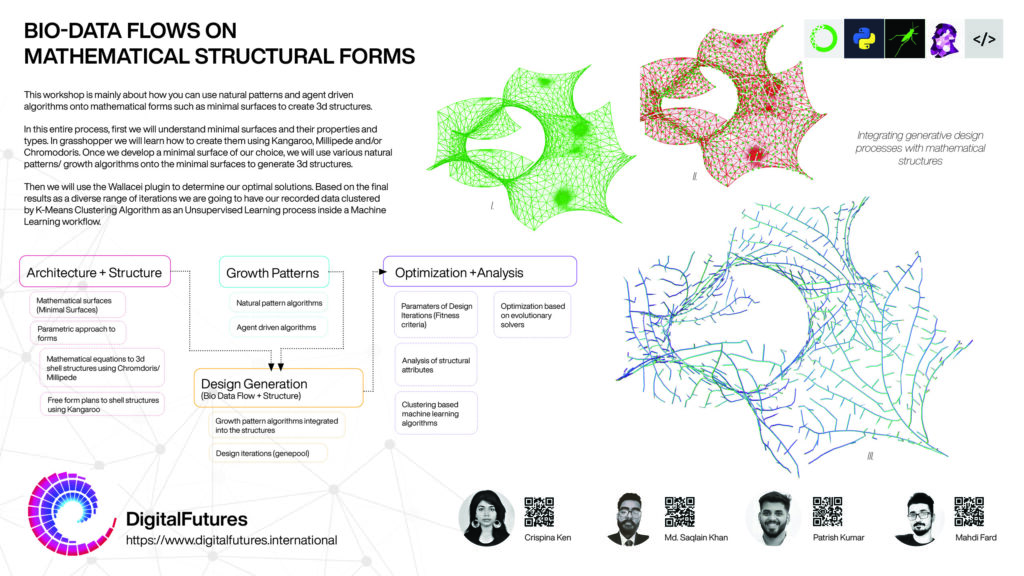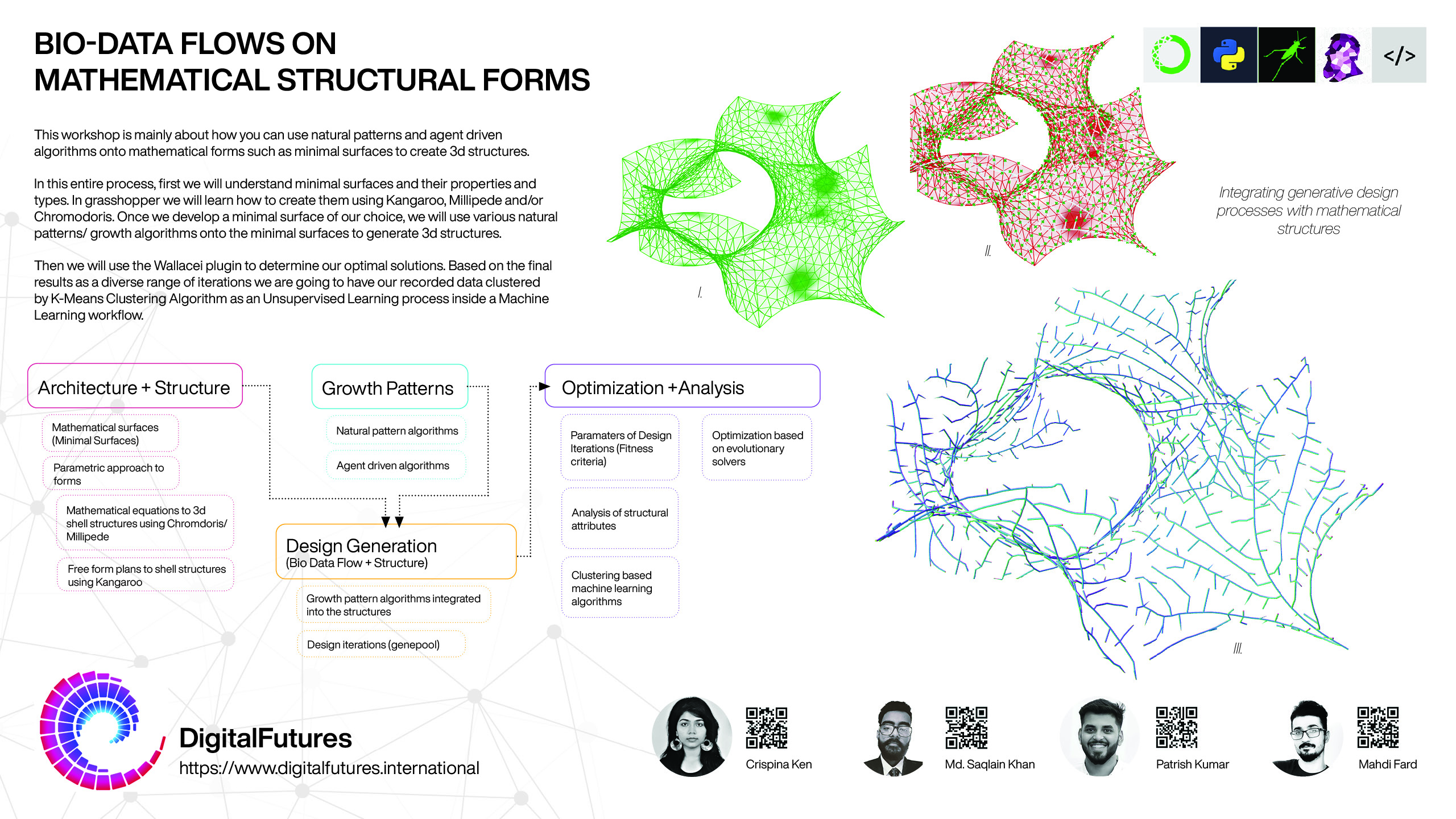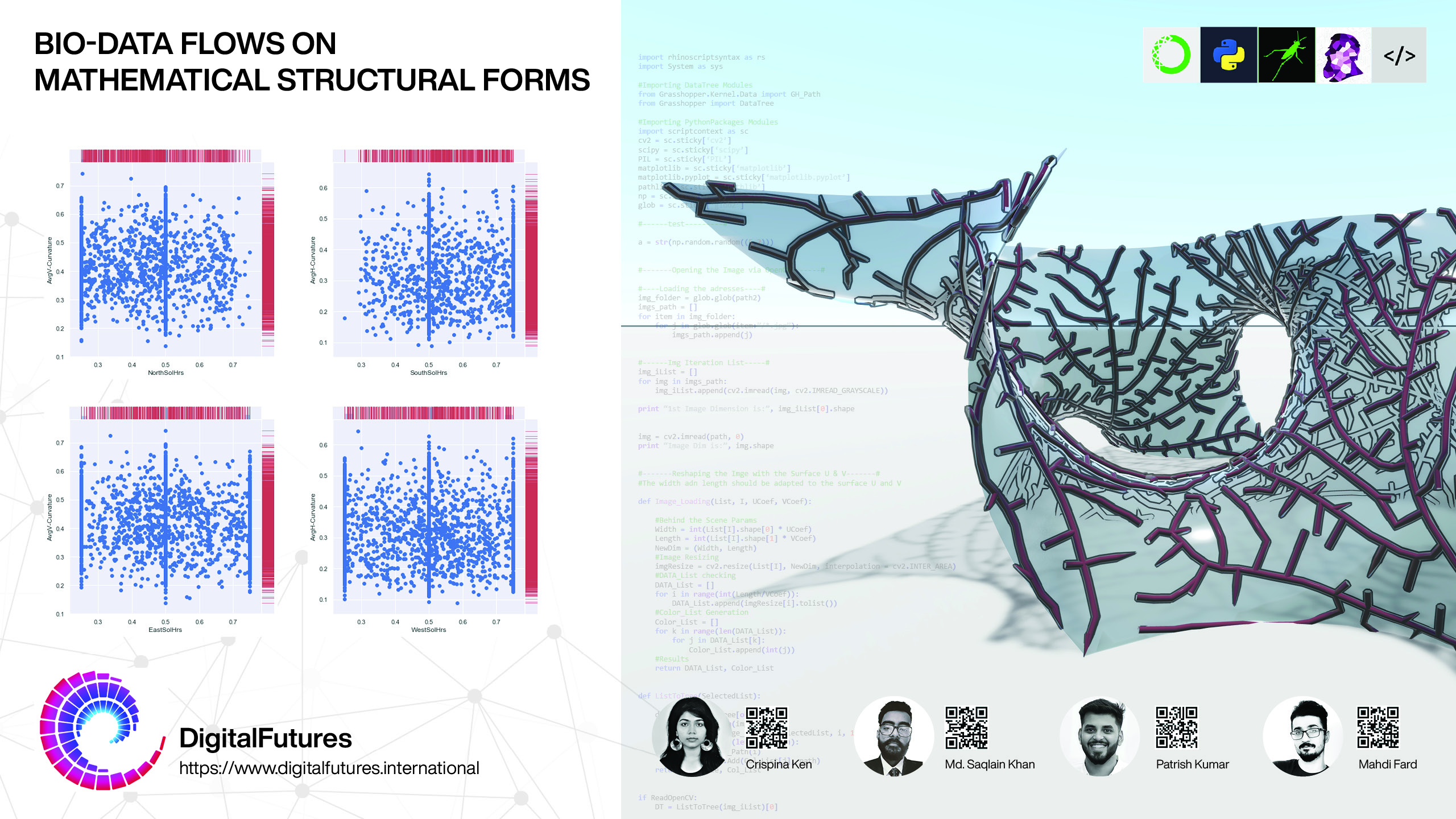
Description:
Required Skills: Good understanding in Grasshopper, Knowing Python is a Plus!
Required Software: Rhinoceros 6/7, Python 3.0 and 2.7 (GhPython), Anaconda 3.0
Required Hardware: Laptop/PC (Windows)
Maximum number of participating students: 100
This workshop is mainly about how you can use natural patterns and agent driven algorithms onto mathematical forms such as minimal surfaces to create 3d structures.
Mathematical surfaces by their very own nature exhibit bending stress and force flows which can be predicted. For example, the minimal surfaces have asymptotic lines which can be used to generate a grid format onto the surface. This data can be used in our workflow to dictate the natural patterns to grow onto the surfaces in a manner as close to the existing force flow lines to get a stable structure. We will further compare the mathematical forms with the 3d generated structures to optimise and generate solutions which would be most optimal.
In this entire process, first we will understand minimal surfaces and their properties and types. In grasshopper we will learn how to create them using Kangaroo, Millipede and/or Chromodoris. Once we develop a minimal surface of our choice, we will use various natural patterns/ growth algorithms onto the minimal surfaces to generate 3d structures.
Then we will use the Wallacei plugin to determine our optimal solutions. Based on the final results as a diverse range of iterations, we are going to have our recorded data clustered by K-Means Clustering Algorithm as an Unsupervised Learning process inside a Machine Learning workflow.
Schedule:
timezone: (GMT +5:30) Bombay, Calcutta, Madras, New Delhi| Start time | End time | Description |
|---|---|---|
| 2022-06-27 - 21:00 | 2022-06-28 - 00:00 | Intro to coursework and developing mathematical (minimal) surfaces using Rhino GH |
| 2022-06-28 - 21:00 | 2022-06-29 - 00:00 | Creating natural patterns and growth algorithms and integration with mathematical surfaces to develop 3d forms |
| 2022-06-29 - 21:00 | 2022-06-30 - 00:00 | Optimization of the 3d forms using Evolutionary Solver |
| 2022-06-30 - 21:00 | 2022-07-01 - 00:00 | Learning Python Basics, Clustering through Machine learning workflow (Relax and learn mode) and Conclusion |
Instructors:
 |
Patrish Kumar | Patrish is a computational designer and architect from Bhubaneswar, India. He graduated from School of Planning and Architecture, Bhopal in 2020. Seeking his inspiration from mathematics and algorithmic thinking, he believes computational and new media technologies possess the potential to reform the AEC industry. Currently, he is continuing his explorations in the generative design paradigm as a research associate at Ardaena, while being a teaching assistant at the Smart Labs programme. He has also been a part of SmartLabs from ratLab - a hybrid programme on Computational design, where he started developing his computational design acumen by exploring diverse building design typologies through Generative Design processes. His projects on the Discrete Skyscraper and Stadium optimizati |
 |
CRISPINA KEN R. S | Crispina is a Computational designer, Architectural Journalist and an Architecture student currently doing her final year thesis under Anna University affiliation in Chennai, India. Her interests in parametric and computational designs began with wanting to explore a futuristic design approach and technological advancements in the construction field. Taking on the interest, she enrolled to be a part of SmartLabs from ratLab - a hybrid programme on Computational design which helped her explore the field in an extensive manner. At present, she is a Research Associate at Ardaena where she is given the opportunity to explore generative designs. She also has a keen interest in architectural journalism with a firm belief in expressing and documenting one's works in their own words. |
 |
MD Saqlain Khan | He is an Architectural student, a Computational designer and a Data Science Student who is interested in creating technologically advanced and environmentally responsible design, He is currently pursuing a dual degree from the National Institute of Technology, Patna and the Indian Institute of Technology, Madras(Institutes of National Importance in India). He is passionate about design, and research, in typical workday. He enjoys the critical analysis of architectural challenges and bringing innovation and efficiency to the process of design. His experience of working on both geometrical as well as functional aspects of architectural design on various scales, combined with his skills of using computational tools for building analytics and simulation, enables his unique perspective. |
 |
Mahdi Fard | He is known for his researches on Integrated Design in Architecture. Mahdi also knows how to deal with DATA flows from different disciplines especially when it comes to Engineering Design. There is a diverse range of Algorithmic Engineering consultancy he has set in high-qualified projects in Iran. He is the lead developer of Caddisfly 01.01, an exclusive Grasshopper3D add-on for detail designing free-from structures which brought up Ardaena.com as a network for professionals. Since his researches are now dedicated to AI and how to deal with a series of data flows algorithmically integrated, he is now working on Generative Design based on Functional Paradigms through Geometry. |
Disclaimer:
All workshops will accept 100 applications MAX.


